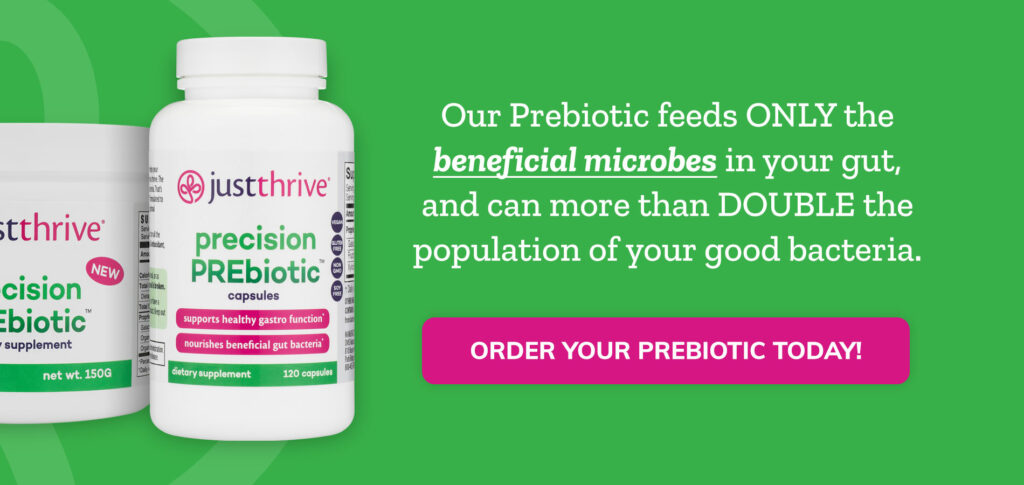Table of Contents[Hide][Show]
If you’ve never heard of prebiotics, your first reaction to a bottle of this increasingly common supplement might be surprise… Did the manufacturer misspell PRObiotics?
But although PRObiotics and PREbiotics are an ideal pairing for your overall health and wellbeing, they’re actually two completely different products. And while prebiotics should be at the top of everyone’s wellness to-do list, they often get overlooked in favor of the more popular probiotics.
Let’s take a closer look at this newer supplement, its uniquely positive health benefits, and how you can get more prebiotics into your system.
What Is a Prebiotic?
Prebiotics are special forms of dietary fiber that sidestep digestion and travel directly to your large intestine, home of the gut microbiome. Once they reach your gut, prebiotics serve as a vital food source for the bacteria that live there.
The prebiotics that you consume can’t be digested by humans. That’s one of the most important things to keep in mind. Your body won’t be able to digest, assimilate, or absorb it. It’s specific food for bacteria.
Now, typically prebiotics are some form of fiber or resistant carbohydrate.
A key thing to remember here is that all prebiotics are dietary fiber, but not all dietary fiber works as prebiotics.
The most well-known prebiotics are called oligosaccharides. That’s a fancy word, but it basically means it’s a very long complex carbohydrate chain structured in such a way that your body can’t digest it for food.
Probiotics pass beyond your digestive system in the small bowel and end up in your colon, where certain groups of bacteria can specifically ferment them for benefit.
That’s what prebiotics are: food for your gut bacteria. But to truly understand how prebiotics function, it’s crucial to understand the relationship between prebiotics and probiotics.
Related
Fiber 101: An In-Depth Guide
Learn the difference between soluble and insoluble fiber, the best way to add it to your diet (as well as what to avoid), and some of its biggest health benefits of fiber.
The Difference Between Prebiotics and Probiotics
Despite the fact that they often get lumped together, PREbiotics and PRObiotics are not the same…not even close.
Before we dive into their relationship, let’s take a closer look at probiotics.
What Are Probiotics?
Your body is teeming with trillions of microorganisms: bacteria, yeast, and other microbes. They’re present in your mouth, nose, sex organs, skin, and gut.
Yes, your gut really is filled with bacteria!
And that’s not a bad thing. In fact, the right kind of bacteria plays a vital role in your physical, emotional, and mental health. These bacteria are known as beneficial or “good” bacteria.
But not all of the bacteria living in your gut microbiome are good bacteria. Your gut also contains colonies of pathogenic or “bad” bacteria.
The two types of bacteria live in your gut, fighting for precious space. Ideally, the beneficial bacteria will be stronger and more numerous, crowding out bad bacteria.
Unfortunately, that’s not often the case. The opposite situation is much more common, with pathogenic bacteria overrunning the beneficial kind, causing a condition known as dysbiosis.
Dysbiosis is incredibly common. In fact, most people—including you—are likely walking around with dysbiosis and don’t even realize it!
Probiotics are the key to rebalancing your gut and allowing beneficial bacteria to thrive.
Probiotics are food, drinks, and supplements containing bacterial strands identical or similar to the beneficial bacteria in your gut. When you consume them, they boost the colonies of good bacteria, swinging the balance in their favor and crowding out bad bacteria.
How Prebiotics and Probiotics Work Together
Like any organism, beneficial bacteria need to eat. And that’s where prebiotics come in.
The probiotic bacteria in your gut microbiome utilize the special fiber in prebiotics as fuel and transform prebiotics into crucial health-boosting compounds—such as short chain fatty acids.
If you have the right prebiotic, it can dramatically amplify the beneficial effects of a probiotic, with both of them enhancing your gut health.
For example, one of the keystone strains of bacteria in your gut that’s really important is called Akkermansia muciniphila.
This keystone strain is a very specialized one that only lives in the gut. If it comes out of the body, it dies within seconds. It can’t exist outside of the human body. Because of this, it’s not found in any supplement on the market.
But it’s a very important protective strain against everything under the cardiometabolic syndrome umbrella, including obesity, diabetes, heart disease, dementia, and so on.
When you have high levels of Akkermansia, you are better protected against those illnesses. So when you take the right probiotic, you’ll see about a tenfold increase in the growth of Akkermansia, which is extremely significant and important.
Then, when you add the right (symbiotic) prebiotic, that tenfold increase skyrockets to an almost thousandfold increase because of how the prebiotic significantly boosts the growth of that Akkermansia.
This is just one example of how a truly symbiotic spore-based probiotic and a precision prebiotic can improve your digestive health in a very significant way.
The Health Benefits of Prebiotics
We already talked about one of the main functions of prebiotics, the way they selectively nourish beneficial probiotic bacteria. That alone makes them a vital part of any wellness routine.
But prebiotics also offer other health benefits, including:
- Improving the diversity and balance of probiotic bacteria in the gut microbiome
- Increasing absorption of essential nutrients
- Supporting healthy immune system function
- Soothing gastrointestinal (GI) distress, such as gas and bloating
Prebiotics and Your Immune System
Prebiotics do a lot to keep you healthy, and improving your immunity is one of their most important actions. That’s why scientists are diving further into prebiotic research to discover new ways these special dietary fibers can improve your health.
In fact, right now scientists are running more than 150 clinical trials looking into how prebiotics positively affect your well-being.
And while that research keeps progressing, scientists have already confirmed 5 ways that prebiotics are essential for a strong immune system and vibrant good health:
1. Combating pathogens: Research shows that some prebiotics directly combat pathogenic bacteria. One study found that fructooligosaccharides (FOS) offer protection against Salmonella and Listeria. Another study demonstrated that galactooligosaccharides (GOS) prevented Salmonella infections in mice. Additional research shows that prebiotics can also combat infectious bacteria like E Coli.
2. Fighting viruses: Groundbreaking science shows us that prebiotics have antiviral properties. In one double-blind placebo-controlled clinical trial including 94 preterm infants, researchers found that the babies given GOS prebiotics had significantly fewer viral respiratory tract infections. Other research shows that supplementing with prebiotics increases the effectiveness of antiviral vaccines.
3. Producing short chain fatty acids (SCFAs): Your immune system relies on SCFAs to perform properly. That includes knowing when not to respond or overreact, which is crucial for staying healthy. SCFAs also help regulate important immune cells and anti-inflammatory compounds.
4. Managing inflammation: Prebiotics help your immune system mount a balanced inflammatory response. Research shows that prebiotics help increase anti-inflammatory compounds and decrease pro-inflammatory compounds. By giving your immune system extra support for inflammation regulation, prebiotics help keep you safe and healthy.
5. Balancing your gut microbiome: Prebiotics are best known for their main gig – feeding beneficial probiotic bacteria. Prebiotics nourish beneficial bacteria in the gut microbiome, helping them grow, flourish, and outnumber harmful pathogens. Proper immune system responses require a balanced gut microbiome full of a diverse population of beneficial bacteria… making prebiotics critical for healthy immune function.
These five important immune-supporting benefits are just the beginning of what prebiotics can do for you. Watch this space – as we learn more about the powers of prebiotics, we’ll share them with you right here.
Related
Prebiotics for a Healthy Gut… and a Healthy You!
Heard about prebiotics but don’t know exactly what they are and what they do in the body? Here’s what you need to know about them, why they are essential to gut health, and how you can easily add them into your daily health regimen.
How to Get More Prebiotics
Prebiotics are naturally present in dozens of high-fiber, healthy foods, including:
- Artichokes
- Asparagus
- Bananas
- Garlic
- Greens
- Kiwis
- Onions
- Soybeans
- Sweet potatoes
- Whole grains
But to get enough prebiotics to make a real difference in your well-being, you’d need to eat pounds of fruits and veggies daily—more than most people can reasonably eat.
On top of that, you might not be consuming the right part of the fruit.
Take, for example, oligosaccharides. These are our baseline, natural prebiotic.
In fact, mother’s milk contains over 200 different types of oligosaccharides. And so the first prebiotics a baby’s ever exposed to are these oligosaccharides, which are also found in various fruits and vegetables.
But here’s where it gets challenging. These benefit-laden prebiotics are typically found in the core or the high-fiber centers of fruits and vegetables.
- There’s one really potent oligosaccharide that comes from kiwi, but it’s found in the fiber component of the kiwi on the inside part of the core.
- Another powerful oligosaccharide is found in the cob of the corn, not in the kernel, not on the outside. It’s on the inside of the cob.
So even if you’re consuming the right fruits and vegetables, you may not be getting their true prebiotic power.
That’s where prebiotic supplements can fill in the gaps… as long as you choose the right ones.
Because with the right prebiotics, your immune system gets a natural boost to help you stay healthy every day.
Choosing the Right Prebiotic Supplement
Choosing the right prebiotic can make all the difference in your health and comfort.
But which prebiotics deliver all of those benefits?
Clinically proven strains of prebiotics include:
- Galactooligosaccharides (GOS)
- Fructooligosaccharides (FOS)
- Xylooligosaccharides (XOS)
With the right prebiotics—GOS, FOS, and XOS—you can feel confident that you’re supplying plenty of immune and digestive support to your system.
But those aren’t the only strains out there. And some of the other popular strains, such as oligofructose and inulin can cause GI distress, or worse.
In fact, some prebiotics don’t just feed beneficial bacteria. Some of them also feed and fuel pathogens, making it harder for your probiotics to keep you healthy.
So always read labels carefully when choosing your prebiotic supplements.
We’re big fans of this prebiotic by Just Thrive. Its powerful formula supplies all three clinically studied prebiotics we mentioned above: GOS, FOS, and XOS. These strands are known for selectively supporting only beneficial probiotic bacteria.
Even better, you can mix up a batch of the Just Thrive prebiotic in the morning and take sips throughout the day, giving your immune system a steady supply of prebiotic fiber around the clock and offering you “prebiotic power” all day long.
Final Thoughts
Still on the fence about prebiotics? We’re here to give them an enthusiastic thumbs-up for your gut, immune system, and overall wellbeing.
Of course, choosing the right prebiotic can make all the difference in your health and comfort. And while some foods can provide prebiotic power, it’s nearly impossible to consume enough of them in a regular diet.
And that’s where a prebiotic supplement fits in!
Choose prebiotic supplements that contain GOS, FOS, and XOS, and you can feel confident that you’re supplying plenty of immune and digestive support to your system.
You May Also Like…






